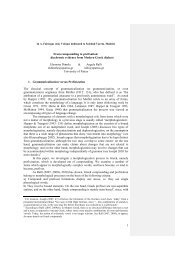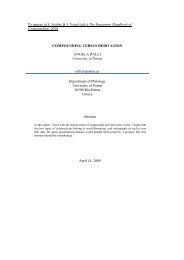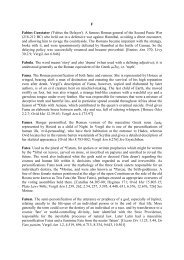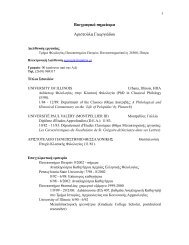Case mismatches in Greek: Evidence for the autonomy of morphology
Case mismatches in Greek: Evidence for the autonomy of morphology
Case mismatches in Greek: Evidence for the autonomy of morphology
Create successful ePaper yourself
Turn your PDF publications into a flip-book with our unique Google optimized e-Paper software.
188 manuel espaol-echevarra and angela ralli<br />
(a) Why is nom<strong>in</strong>ative <strong>the</strong> only alternative <strong>Case</strong> value <strong>for</strong> CLLD constituents,<br />
as shown <strong>in</strong> (11)(12), which <strong>in</strong>volve a dative and an accusative dislocated<br />
constituent respectively 11<br />
(11) (a) ()O Pavlos, tu pirane to pedi<br />
<strong>the</strong>-nom Paul-nom, him-gen took-away-3pl <strong>the</strong> kid<br />
(b) Tu Pavlu, tu pirane to pedi<br />
<strong>the</strong>-gen Paul-gen, him-gen took-away-3pl <strong>the</strong> kid<br />
`They took <strong>the</strong> kid away fromPaul'<br />
(c) *Ton Pavlo, tu pirane to pedi<br />
<strong>the</strong>-acc Paul-acc, him-gen took-away-3pl <strong>the</strong> kid<br />
(12) (a) ()I tites, i kathijites tus agapane olus<br />
<strong>the</strong> students-nom, <strong>the</strong> pr<strong>of</strong>essors-nom <strong>the</strong>m-acc love-3pl all-acc<br />
`The pr<strong>of</strong>essors love all <strong>the</strong> students'<br />
(or The students, <strong>the</strong> pr<strong>of</strong>essors love <strong>the</strong>m all)<br />
(b) Tus tites, i kathijites tus agapane olus<br />
<strong>the</strong> students-acc, <strong>the</strong> pr<strong>of</strong>essors-nom <strong>the</strong>m-acc love-3pl all-acc<br />
`The pr<strong>of</strong>essors love all <strong>the</strong> students'<br />
(or The students, <strong>the</strong> pr<strong>of</strong>essors love <strong>the</strong>m all)<br />
(c) *Ton titon, i kathijites tus agapane olus<br />
<strong>the</strong> students-gen, <strong>the</strong> pr<strong>of</strong>essors-nom <strong>the</strong>m-acc love-3pl all-acc<br />
(b) Why do Nom<strong>in</strong>ative, Accusative, and Genitive behave dierently <strong>in</strong> free<br />
relatives contexts, which comb<strong>in</strong>e a CLLD-cha<strong>in</strong> and a wh-cha<strong>in</strong>, cf. section 1<br />
We deal with <strong>the</strong> questions <strong>in</strong> (a) and (b) <strong>in</strong> sections 2.2 and 2.3, respectively.<br />
11<br />
As shown by <strong>the</strong> follow<strong>in</strong>g example, <strong>the</strong> sentence becomes ungrammatical if <strong>the</strong> dislocated<br />
constituent appears <strong>in</strong> Vocative.<br />
(i) *Pavle, tu pirane to pedi<br />
Paul-voc, him-gen took-away-3pl <strong>the</strong> kid<br />
Vocative is <strong>the</strong> fourth value <strong>of</strong> <strong>the</strong> <strong>Greek</strong> <strong>Case</strong> system, but it will not be considered here<br />
because <strong>of</strong> its special character: it is <strong>the</strong> case <strong>for</strong>m <strong>of</strong> address and marks constituents<br />
that stand outside construction, bear<strong>in</strong>g no relation <strong>of</strong> dependents to heads. On <strong>the</strong><br />
o<strong>the</strong>r hand, as shown byKuryowicz (1964, 188), Nom<strong>in</strong>ative, Accusative and Genitive<br />
are <strong>the</strong> most grammatical cases, that is <strong>the</strong> cases closely related to grammatical<br />
relations.<br />
Acta L<strong>in</strong>guistica Hungarica 47, 2000










